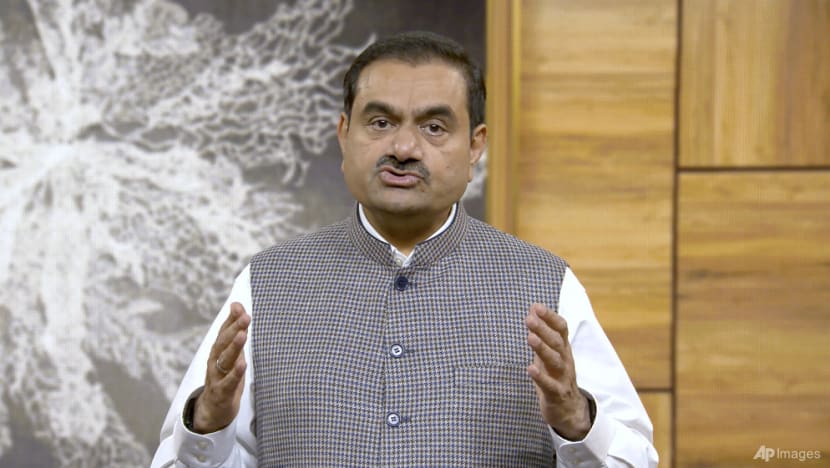Gautam Adani's US$58 billion wealth wipeout in six days has few parallels
India's Gautam Adani has lost more than Sam Bankman-Fried and been wiped out almost as fast as Elon Musk, highlighting the unique risks in India and within his empire.

This screengrab from a video released by Adani Enterprises on Feb 2, 2023, shows Indian billionaire Gautam Adani addressing investors from an unknown location. (Screengrab: AP/Adani Enterprises)
Gautam Adani has seen US$58 billion erased from his personal fortune in the span of just six trading days - a downfall so spectacular that it defies just about every historical comparison.
He is not quite like one-time crypto wunderkind Sam Bankman-Fried or Archegos Capital Management's Bill Hwang, who went from tens of billions to nothing in a flash as their leveraged trades imploded.
After all, even after a share-price collapse in the wake of Hindenburg Research's short-seller report, Adani oversees a sprawling conglomerate that builds capital-intensive infrastructure such as ports and airports in line with Prime Minister Narendra Modi's development goals.
His wealth drop is far bigger than Brazil's Eike Batista's, who similarly used his commodities empire to build national infrastructure like shipyards and ports with support from the government. It took Batista about a year to lose his entire US$35 billion fortune, becoming known as the first known "negative billionaire".
And even though Elon Musk was the first person in history to lose US$200 billion - and has had an episode when his wealth plunged about as much as Adani's - he has since bounced back in a big way.
The Tesla chief executive has added US$36.5 billion to his personal fortune this year, the most of anyone tracked by the Bloomberg Billionaires Index.
All told, Adani's wealth wipeout is among the most severe in terms of scale and speed since Bloomberg began tracking billionaires in 2012.
He is worth US$61 billion, down from a peak of US$150 billion in September and US$119 billion before the Hindenburg report was released, according to the index.
The precipitous fall highlights the unique ways in which Adani, 60, climbed up the wealth rankings in the past two years, at one point surpassing every billionaire on the planet except for Musk.
Many of the tactics were flagged by Hindenburg as it alleged fraud: A large concentration of insider share ownership, rampant use of leverage and valuations that were elevated by just about every measure.
Adani has expanded his conglomerate aggressively, with a push into green energy and infrastructure in particular, securing investments from firms including Warburg Pincus and TotalEnergies.
Adani Group utilised margin loans to fund its ambitions, and had to put up about US$300 million worth of shares last week to maintain its collateral cover on a loan made by a group of banks including Barclays.
Adani Group has repeatedly denied Hindenburg’s allegations, calling the report "bogus", and threatening legal action.
Still, its flagship Adani Enterprises scrapped a US$2.5 billion follow-on share sale that was fully subscribed but drew scant retail investor interest, and units of Credit Suisse Group and Citigroup have stopped accepting some Adani securities as collateral for margin loans.
It is not yet clear to what extent India's government will get involved.
Its parliament was adjourned for the day after pandemonium broke out when the upper house chair rejected opposition lawmakers' demand for a debate on Adani.
Modi has said nothing on the matter so far.
Meanwhile, India's central bank has asked lenders for details of their exposure to the conglomerate, according to people familiar with the matter.
State Bank of India, the country’s largest financier, has loaned as much as US$2.6 billion to Adani companies, about half of what is allowed, according to a person familiar with the matter.
"Adani and his officials are trying their best to paint it as a foreign conspiracy against the rise of India as an economic power," said Ashok Swain, head of the Department of Peace and Conflict Research at Uppsala University in Sweden.
"The market has not bought this bluff. As Adani's stock has been crashing for a week now, the nationalism pitch is gradually losing its relevance."
Adani, who dropped out of college to try his luck in the diamond industry, is now the third-richest person in Asia, behind peer Mukesh Ambani and China's bottled-water king, Zhong Shanshan. He is now No 21 globally.















